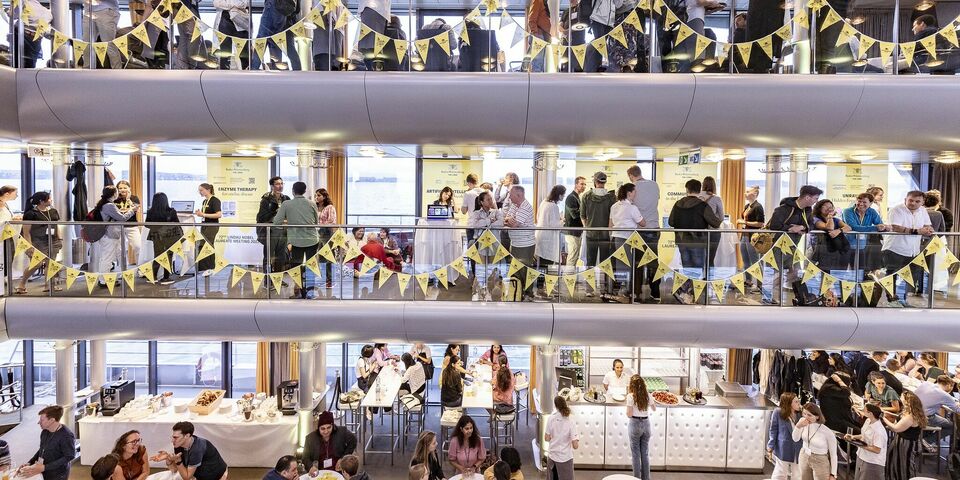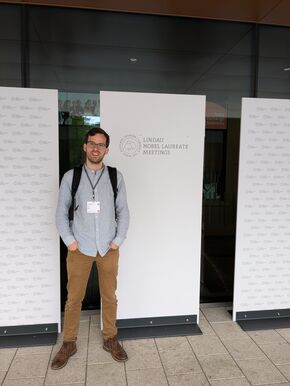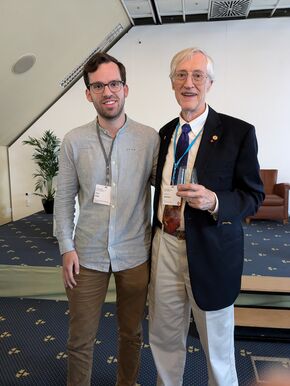Networking with Nobel laureates
This week, the southern German town of Lindau is brimming with young, talented scientists from all over the world. For five days, they are meeting with about thirty Nobel laureates in an informal setting at the annual Lindau Nobel Laureate Meeting. This year, the focus is on the field of Physics. TU/e PhD candidate Mike Pols is one of the seven Dutch participants walking around Lindau. Quite literally, because he has a Science Walk with experimental physicist Steven Chu on his agenda.
Some six hundred and fifty young scientists – mostly PhD candidates and postdocs, and a few master’s students who are about to graduate – arrived in the southern German town of Lindau on Sunday. What awaits them there is a week of meetings with Nobel laureates, in an informal setting. Since 1951, the Lindau Nobel Laureate Meeting has been organized annually. To transfer knowledge between different generations of researchers, but also to strengthen international networks and in particular to inspire young scientists. Educate – Inspire – Connect, is the theme of this year’s meeting.
“A scientific school trip” laughs Mike Pols, PhD candidate in the TU/e research group Materials Simulation & Modelling. He is one of seven promising young researchers working at a Dutch university who were nominated by the Royal Netherlands Academy of Arts and Sciences (KNAW) this year. “It’s a privilege to be here,” he reflects – via email – on the first few days. “It’s incredibly inspiring, both for the students and the Nobel laureates. There’s a lot of talking; everyone is very open, especially during the “Open Exchanges”. I took a picture with John C. Mather, who won the Nobel Prize in 2006. And yesterday, I saw British Nobel laureate Duncan Haldane (2016) sitting alone at a lunch table and we had an extensive discussion about our research. A unique opportunity.”
Right place, right time
A week earlier, I spoke to Pols at his usual TU/e spot, in the Cascade building. He is looking forward to the Lindau week, Pols says enthusiastically. Finally. Four years ago, when he was working on his graduation, he had already been selected to participate in the Lindau Nobel Laureate Meeting. But less than a month after he had received his selection letter, the meeting was called off due to Covid-19 measures. Still, Pols looks back very positively on the hastily organized online meeting. “It was an amazing experience. The subject-specific presentations were fantastic, of course, but especially the views on broader issues at play within science. And the stories about the roads leading to the Nobel Prize gave me a lot of personal perspective. A creative brain will get you far, but it’s also often a matter of being in the right place at the right time.”
But now, he gets to “shake hands” with about thirty physics Nobel laureates after all. What is he looking forward to? “I already got a taste of the Lindau experience online; now I can really immerse myself. From the collective breakfast to an extensive lecture program and the evening drinks reception. It’s a packed program, but definitely inspiring. Another special element is the Science Walk, where a small group of participants can have an informal conversation with a Nobel laureate of their choice while on a walk.”
Now that Pols is almost finished with his PhD track – he hopes to defend his research at the start of the coming year – the timing is even better than four years ago, he admits. “I have a better sense of where my interests lie. Also, I’m interested in possibly continuing in academia as a postdoc and am curious about the experiences of other participants. In terms of networking, a driven, talented group of young scientists is also very positive, of course.”
Helicopter view
For the past few years, Pols has been busy primarily with his own research project. He is developing a new type of perovskite solar cell, which is supposed to replace the regular solar cell. However, he already took away an important message from the previous online Lindau Meeting: always put what you do in perspective. “Of course I don’t believe that I can personally solve the energy crisis, but I do see the societal relevance of my research. And I prefer to dive into a relevant problem; it’s not just about pure science.”
To gain a better understanding of the balance between scientific research and societal impact, Pols opted for a Science Walk with experimental physicist Steven Chu. Chu was one of the 1997 laureates of the Nobel Prize in Physics, and made a political career as Secretary of Energy in 2009, under President Obama. Pols is curious about his perspective. “Should you, at some point, shift your focus from research to contributing to society? And how do you choose that moment? Because if you always stay between the proverbial four walls, you run the risk of getting lost in the details. That is why I try to keep a helicopter view.” In search of these and other answers, his hiking shoes are already at the ready.




Discussion